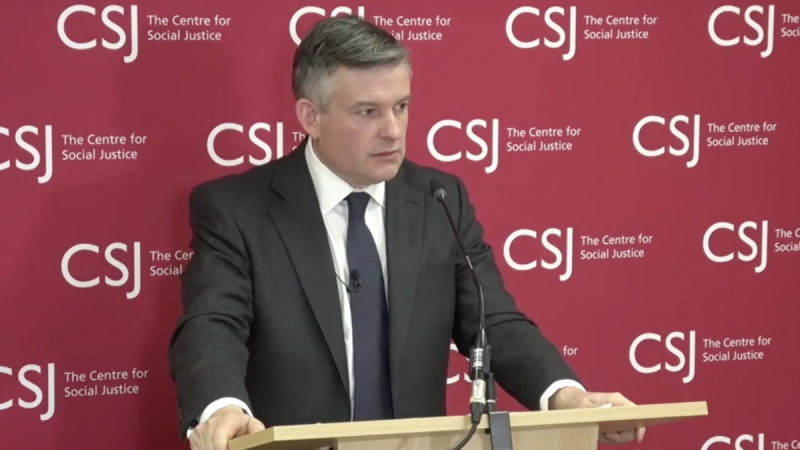
“People who can work, should work… 2.6 million people are out of work due to long-term sickness. A healthy nation is critical to a healthy economy.” These are not the words of a Tory welfare hawk, but those of Shadow Chancellor Rachel Reeves in response to the autumn statement yesterday afternoon.
Hidden by the red meat Jeremy Hunt threw out to his backbenchers – threatening to remove welfare completely from the so-called workshy – the Conservatives have rolled out Universal Support to help people back into work, and yesterday announced a “Chance to Work Guarantee”, protecting benefits for those not fit to work but who want to give it a go. Two progressive policies long championed by the Centre for Social Justice (CSJ), with the latter adopted by Labour months before the Tories.
Reeves understands that the 500,000 increase in people out of work due to long-term sickness is a serious challenge to the UK economy. The proportion of the working age population on out-of-work benefits has increased by 27.5% from November 2019 to May 2023, with the 2.6 million economically inactive due to long-term sickness costing the taxpayer an eye-watering £15.7bn a year.
Labour led the way on welfare reform earlier this year
Earlier this year, Labour led the Tories on welfare reforms to help these people. Former Shadow Work and Pensions Secretary, Jon Ashworth, was among the first to recognise the alarming rise in the no work requirements welfare cohort.
He signalled Labour’s interest in Universal Support in January to provide back to work support and, in April, proposed an ‘into work guarantee‘, asking in parliament why the government had not adopted “the policy that we have put forward which is supported by the Centre for Social Justice, to change the work capability assessment rules and offer an into work guarantee for those with no work requirements”.
The government may not admit it, but Ashworth’s interventions put rocket boosters on its response to economic inactivity.
Which is why Labour’s response to these issues in the autumn statement – focusing on the NHS – is bemusing. Waiting lists are a part of the problem, but they are far from all of it. CSJ analysis has shown that one in five people on sickness and disability benefit – some 700,000 people – want to work with the right support. Is it really the case that they – and our faltering economy – are going to have to wait while Labour attempts to fix the NHS?
To regain the agenda, the party must go further in its offer
There is still time for Labour to seize back the agenda. We need to make work pay. The Chancellor announced a significant fall in hourly low pay over the last 13 years – but the fact is weekly low pay is still rife, with nearly a quarter of all jobs in the weekly low pay category in 2023.
As a start, Labour should pledge to reinstate work allowances for childless households. These were cut by the government in 2016 and have meant people moving into work from welfare begin to have their Universal Credit withdrawn at 55% for every pound earned. New workers face an effective tax rate larger than Britain’s highest earners.
And Labour can recapture the ground it first championed by rolling out Universal Support in full. The government’s approach introduces participants to employers straight after assessment for the programme. However, many people are months away from being ready to start a job and require intensive support if employment is to become a credible possibility.
The Shadow Chancellor is right to say that people who can work should. And in showing interest in Universal Support and proposing an into work guarantee, Labour has led the way in helping those who want to work, but currently cannot. But there is still much to be done and much that can be done now. It would be a mistake to leave such potential on another waiting list.




More from LabourList
‘Council Tax shouldn’t punish those who have the least or those we owe the most’
Two-thirds of Labour members say government has made too many policy U-turns, poll reveals
‘Two states, one future: five steps on the path to peace for Israelis and Palestinians’